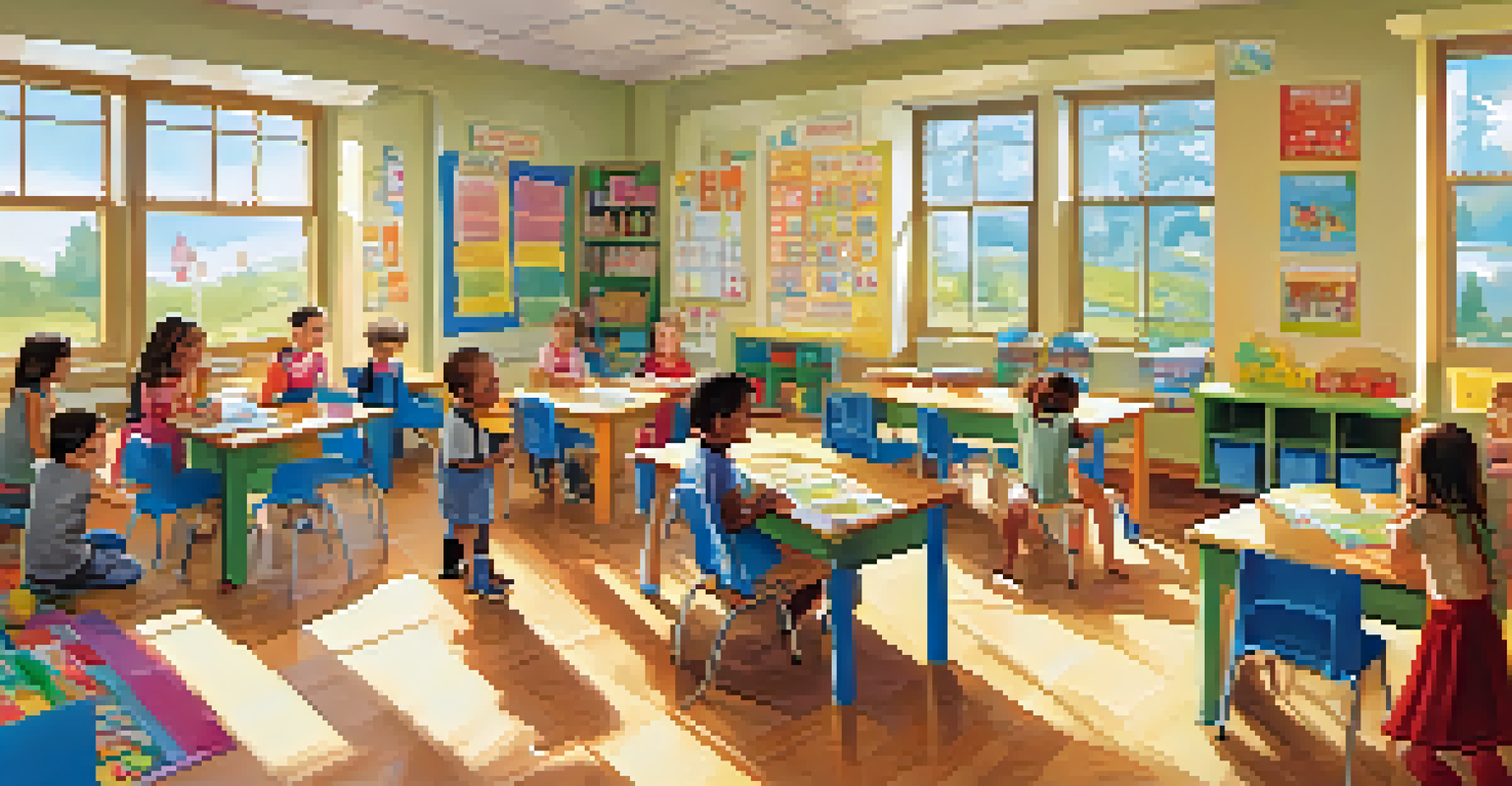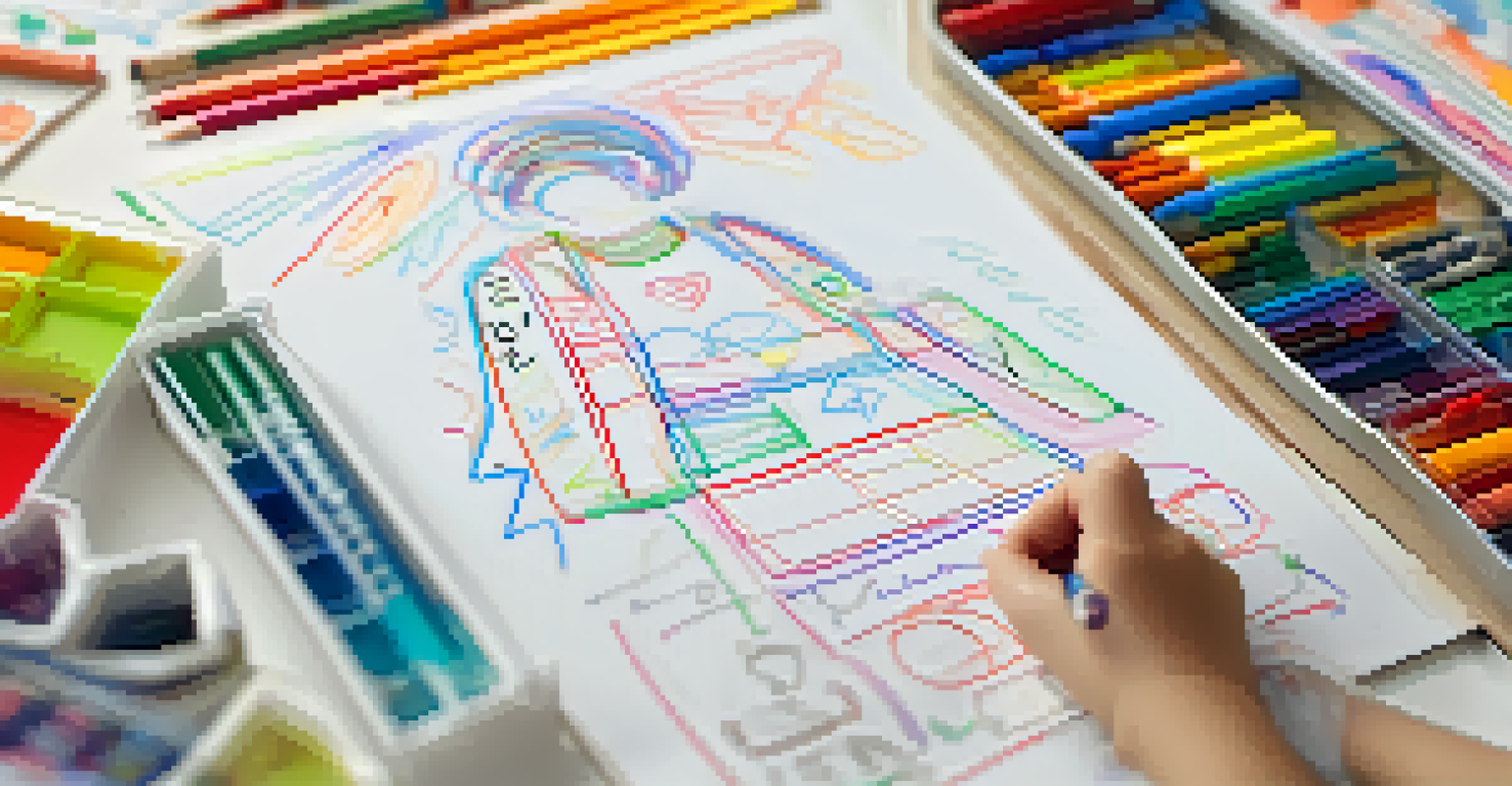Using CBT to Develop Social Skills in Children

Understanding Cognitive Behavioral Therapy (CBT)
Cognitive Behavioral Therapy, or CBT, is a form of psychotherapy that focuses on the relationship between thoughts, feelings, and behaviors. It helps individuals identify negative thought patterns and replace them with more positive, constructive ones. This technique is especially beneficial for children, as their social skills are still developing and can benefit from guided support.
The greatest weapon against stress is our ability to choose one thought over another.
In essence, CBT equips children with tools to understand their emotions and reactions in social situations. By recognizing how their thoughts influence their feelings, they can learn to approach social interactions with a healthier mindset. This foundational understanding is crucial for fostering better communication and relationships as they grow.
For children who struggle with social skills, CBT provides a structured approach to practice and improve these interactions. The techniques learned in therapy can be applied in real-life situations, making it a practical tool for social development.
Identifying Social Challenges in Children
Children may face various social challenges, such as anxiety, shyness, or difficulty understanding social cues. These issues can hinder their ability to make friends, participate in group activities, or express themselves effectively. Identifying these challenges is the first step in addressing them through CBT.

For instance, a child who feels anxious in group settings might avoid playing with peers altogether. By recognizing this pattern, therapists can help the child understand the underlying thoughts that contribute to their anxiety. This awareness opens the door to exploring strategies that can make social interactions feel less daunting.
CBT Enhances Children's Social Skills
Cognitive Behavioral Therapy equips children with tools to understand and improve their social interactions.
Once specific challenges are identified, CBT can tailor strategies that target these issues directly. This personalized approach ensures that the child receives support that resonates with their unique experiences, making it easier for them to engage socially.
Building Awareness of Social Cues
Social cues—like body language, tone of voice, and facial expressions—are essential for successful interactions. Children often struggle to recognize or interpret these cues, which can lead to misunderstandings. CBT can help children become more aware of these signals in a fun and engaging manner.
Children are not things to be molded, but are people to be unfolded.
Through role-playing exercises, children can practice observing and responding to various social cues. For example, they might act out a scenario where one friend is upset and learn to recognize the signs that indicate how they can help. This hands-on practice builds their confidence and enhances their ability to navigate social situations.
As children become more adept at recognizing these cues, they'll find it easier to connect with their peers. This newfound awareness not only improves their interactions but also fosters empathy, helping them to understand how others might be feeling in different situations.
Enhancing Communication Skills
Effective communication is a cornerstone of social skills, and CBT can significantly enhance these abilities in children. By focusing on both verbal and non-verbal communication, children learn how to express themselves clearly and listen actively. This dual approach is vital for building strong relationships with others.
One practical exercise involves teaching children to use 'I' statements, which encourage them to express their feelings without blaming others. For instance, instead of saying, 'You never listen to me,' they might say, 'I feel ignored when I'm not being heard.' This technique helps them communicate their needs more effectively and reduces potential conflicts.
Role-Playing Builds Confidence
Practicing social scenarios through role-playing helps children gain confidence and prepares them for real-life interactions.
Additionally, practicing active listening skills enables children to engage more meaningfully in conversations. They learn to ask questions, show interest, and respond appropriately, which makes their interactions more rewarding and enjoyable.
Practicing Social Scenarios through Role-Playing
Role-playing is a powerful CBT tool that enables children to practice social skills in a safe environment. It allows them to explore different scenarios, such as making new friends or resolving conflicts, without the pressure of real-life stakes. This form of practice builds their confidence and prepares them for actual social interactions.
During these sessions, children can act out various roles, experiment with different responses, and receive feedback. For example, they might role-play a situation where they need to introduce themselves to a new classmate, helping them develop a script they can use in real life. This practice not only enhances their skills but also makes them more comfortable in unpredictable social situations.
Moreover, role-playing encourages creativity and problem-solving, as children learn to navigate different responses. This process fosters critical thinking about how their behavior affects social outcomes, ultimately preparing them for more successful interactions.
Setting Realistic Goals for Social Development
Goal setting is an essential part of the CBT process, particularly when it comes to developing social skills. By establishing clear, achievable objectives, children can see their progress and stay motivated. Whether it’s initiating a conversation with a peer or participating in group activities, setting small, manageable goals can lead to significant improvements over time.
For instance, a child might set a goal to greet a classmate every day for a week. This small step can build their confidence and create a routine that encourages more extensive social engagement. Tracking progress and celebrating achievements, no matter how minor, reinforces their efforts and helps them stay focused.
Parental Involvement is Key
Engaging parents and caregivers in the CBT process creates a supportive environment that reinforces social skill development.
Additionally, discussing these goals with parents and teachers can create a supportive network that encourages the child's social development. This collaboration ensures that the child has the necessary support and resources to meet their objectives, making the journey smoother.
Involving Parents and Caregivers in the Process
The involvement of parents and caregivers is crucial in the CBT process for developing social skills. By understanding the techniques used in therapy, they can reinforce practices at home and provide additional support. This collaborative approach creates a consistent learning environment that benefits the child’s growth.
For example, parents can encourage their children to practice communication skills by engaging in family discussions or role-playing together. This not only strengthens the bond between parent and child but also creates opportunities for the child to apply what they've learned in therapy.

Moreover, caregivers can help monitor the child's progress and provide feedback. Celebrating successes and discussing challenges together fosters a sense of teamwork, making the child feel supported and understood as they navigate their social skill development.